Cleaning up statist bullshit can take a while
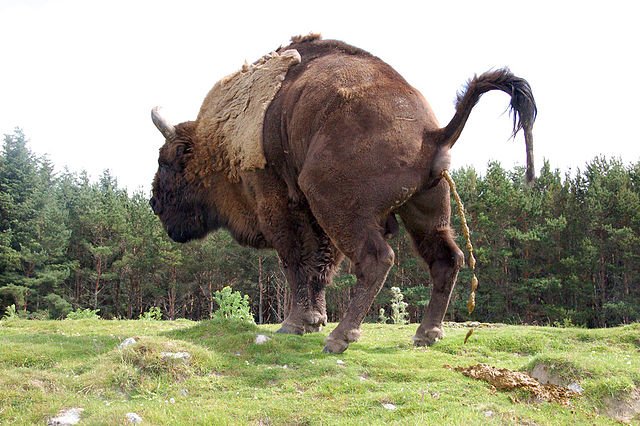
One
small dose of bullshit can make a stain that takes ages to clean up
(Defining stuff can sometimes be
useful).
A
problem that sometimes occurs when trying to discover,describe and
share objective reality via argumentation or debate with a statist, is,
when one party spouts some short, irrational or illogical bullshit
claim, or statement, on some topic of conversation....(economics is a
good example of a subject where this occurs... over and over again), it
can often take paragraphs and paragraphs of text to present reasoned
argumentation to refute the nonsense being claimed.
Oh.... the claim or statement may just be the regurgitation
of some mainstream media garbage that has been repeatedly spewed across
the airwaves, or it may be a deliberate tactic employed by one debater
in the attempt to bog down or muddy the waters in an attempt to
obscure the reasoning of the opposing debater.
Here's a random example........(Let's see how long this takes....)
Most people will be familiar with the old commie rant...
“.....Property is
theft...”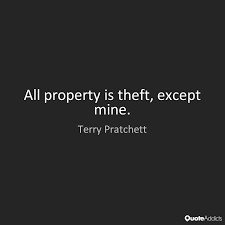
While
it doesn't take a genius to show (by empirical evidence) how this
claim cannot honestly be held (believed) by the person making the
claim, it's quite unlikely that mere evidence is sufficient to
persuade the guy making this claim to abandon his belief in the validity
of the phrase.
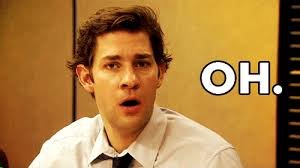
(The
same type of “thinking” that got him to accept this position – that
property is theft – is unlikely to help in getting him to abandon his
position.
i.e. He had the empirical evidence available to him to refute the
claim the first time he heard it, so it's unlikely that, presenting
that same empirical evidence to him this time around is going to make
much difference (in his belief)).
So, maybe it could be fun to look at the language and (generally
accepted) definitions of the words contained in the statement.
(After all, it's reasonable for both parties to assume that the words
they use to communicate ideas have the same meaning for both
parties..... right?...........Well.......... maybe.....it
depends......sort of...)
“Property is theft” is a sort of self-detonating statement.
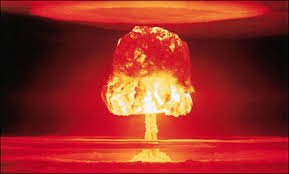
I'll
try to explain.....
The subject of the phrase is “property” A generally acceptable
definition of the word “property” would be, e.g. Usually..........
Property - a material/physical thing “owned” by someone.
(The idea of property, implies ownership).
For completeness, lets define “ownership”
(Ownership) – Having exclusive control of that “material
thing.”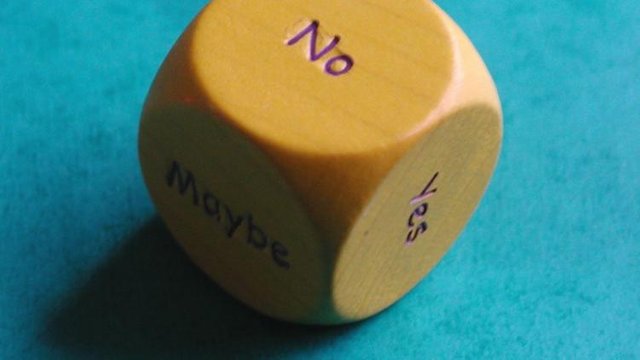
The
word “Is” can be defined as "the state of being, in the present
tense."
That should be simple enough for most people to understand and accept,
unless they have a leaning more towards the clintonian school of
slimey-pretzel-sematics, within which, that particular “is” seems
to be undefinable in the normal sense, in that apparently its meaning
can do a fair bit of shape-shifting, depending on the particular
shit-hole out of which you're attempting to climb. (That particular
is, is not is, but is....... obviously)
A couple of definitions of "Theft"

1st
- A generally accepted definition of theft is the “taking away of
some property, without expressed permission from the owner.”
2nd - However it could be argued that a better or more complete
definition would be ............“the deliberate deprivation of the
owner of the exclusive use of his property.”
Here's why I'd argue that the 2nd definition may be a better
one......
A simple example
could be – You ask a garage mechanic to change the oil in your car and
adjust the brakes. When you return to collect your car, you receive
a huge bill because the brake discs have been replaced and you have a
new carburettor fitted. Obviously you don't want to pay for this as you
hadn't previously agreed to this particular work being done, As a
result of the disagreement, the garage owner refuses to give you your
car keys until you cough up.....
The garage owner is obviously trying to screw you ….. of course.
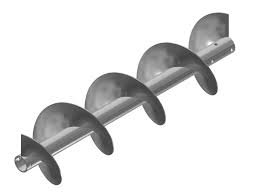
We
can all understand that.
Now, since he hasn't removed your car from your possession – remember
you drove your car to his garage and gave him your car, - then he
hasn't actually taken your car away from you without your permission.
So the 1st definition doesn't really describe the mechanic's actions
adequately.
However:
an argument can be made that that since he isn't allowing you to remove
your car from his garage forecourt, thereby preventing you from
exercising your right to use your property
by the 2nd definition of theft,he is guilty of the theft of your car
(property).
Ok. So now we understand, and can hopefully agree on the meanings of
the 3 words in the phrase “property is theft”
So how is the phrase self-contradictory?
Well....... Property as previously mentioned is a thing owned by
someone.
Theft is the force-able deprivation of the owner of the use of that
thing.
The phrase is a claim that “property” is illegitimate, but at the
same time, seems to accept the notion that “theft” has a legitimate
meaning. i.e. It is possible to steal something.
But, since one cannot have “theft” unless there is a legitimate
owner from whom the thing (property) can be stolen, the claim
simultaneously accepts and rejects the notion of property.
Now, as I'm sure people reading this will be aware, there are lots of
claims and arguments presented by people who don't believe the idea of
property rights to be legitimate. While, it is true that the idea of
property rights is just that, an idea, a human social construct,
property rights exist in order to solve a problem. That is, to
reduce the likelihood of conflict in human societies.
While we live on a fairly big planet, with lots of useful resources
that we can employ to enable us to survive, and even raise our living
standards and so on, these resources are limited in quantity.
If there were, say, only a few thousand people on the planet, it would
be true to say that natural resources are limited, i.e. finite, but
it wouldn't likely occur to people to say that natural resources were
“scarce.” (Scarcity implies that it's possible to run out of stuff
if used uneconomically).
However, although many natural resources are plentiful, they are not
evenly distributed around the planet, Therefore, even small populations
of
people can experience scarcity of natural
resources.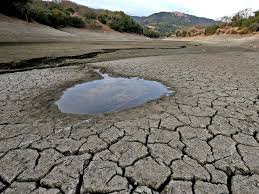
e.g.
desert-living people may consider water to be a scarce resource, even
though the planet surface is 60% or 70% covered by the stuff.
People in high mountainous areas may experience scarcity of trees, and
so, lack wood to burn for heating, so they may have to use less
efficient animal dung for burning, to heat their houses.... and so on.
Since at least some resources can be scarce, how are people to manage
to agree to the usage of them?. Well, there are several ways they
could try. A couple of which may be.........
They can all fight over the resource and the last man standing gets
ownership of the resource. …................... This isn't very
efficient for many reasons, of which one is …......“there's always a
bigger tougher guy gonna come around the corner tomorrow and try to take
your stuff.” So the owner has to spend some of his scarce time and
energy just to repel legitimate challengers to his property rights.
2 - If Everybody gets to own the resource, simultaneously
......... Well........ Since ownership by definition means “exclusive
control of..” then you end up with the effective equivalent of no-one
owning it, since it would take forever for one person to attain
permission from all the other owners to do something with the resource.
What you end up with is a situation known as “The tragedy of the
commons” where everyone has the incentive to use as much as the
resource as possible as quickly as possible, since he doesn't really
have much ownership of it. (or much of a stake invested in it). And he
knows that everyone else is thinking along the same lines. This usually
results in the resource becoming depleted very quickly, and so
everyone is ultimately worse off.
3 - The first guy
...............who homesteads the resource is recognised as having the
most valid/legitimate claim to the resource. This guy can invest his
efforts into maximising output from the resource and also has the
incentive to make the resource last as long as possible so it will
help sustain him and his family for many years. He has a
disincentive to “eat it all at once.”
Since his claim is legitimate and no-one else can come along with a more
valid claim, he doesn't have to "keep looking over his shoulder",
not knowing when he may be challenged to fight to retain his property.
He can make long term investments in his property with the confidence
that he will see returns on his long term investments.
To own property, means that you have a right of ownership. i.e.
everyone accepts that you have the most valid claim of ownership and
therefore it is agreed that you have a right to exercise exclusive
control over that object. (This is what "legitimate" means - i.e.
everyone agrees that something is valid)
How you came by that right legitimately can be any one of 3 ways....
1 – You homesteaded the property
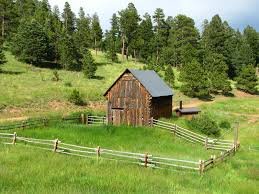
which
was previously not claimed by anyone else. (Homesteading usually means
improving a bit of e.g. land, such that it is made more useful to fulfil
a certain purpose... e.g. farming)
from
a previous owner in a voluntary exchange of (perceived) value for
(perceived) value.
3 – The property is inherited by
you
,
or bequeathed to you in a will from a previous legitimate owner.
Nb -
Nb (It should be obvious here that the word property is here being
used as a pronoun to label a physical object, and not some attribute of a
physical object. e.g. The metal called mercury has the “property” of
existing in a liquid state at room temperature. (This is not the
“property” under discussion)).

